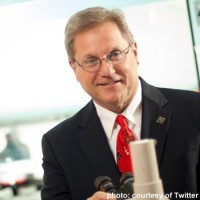What Do The Four Presidential Nominees Think About Energy and Nuclear Power?
It is highly unlikely that the issues surrounding energy will make any difference in whomever we choose for our next President. Other concerns have drowned out energy as an important issue. That said, there are distinct differences among the four presidential nominees with regard to energy, particularly nuclear.
Democrat Hillary Clinton supports an all-of-the-above energy strategy with a tilt towards non-fossil fuels, including nuclear, to address climate change. In particular, Clinton wants to generate 50% of U.S. energy from renewables by 2020, launch a $60 billion clean energy initiative, cut oil and gas subsidies, oppose Keystone XL pipeline, adopt stronger regulations on fracking, implement a $30 billion economic diversification initiative for coal-mining regions, and stop premature closing of nuclear plants.
Republican Donald Trump supports an all-of-the-above energy strategy with a tilt heavily towards fossil fuels, with no regard to climate change. Trump wants to increase American energy production to add jobs and bring the country closer to energy independence. Trump's energy plan proposes to remove bureaucratic blocks to innovation and energy exploration. He thinks the energy marketplace should determine the best mix of domestic energy sources. In general, a Trump Presidency could be a return to the general energy policies of the last century.
Libertarian Gary Johnson, while acknowledging that climate change exists, does not believe the international community will do anything about it. He supports the free-market as the way to determine our energy mix. In keeping with Libertarian philosophy, Johnson feels private property rights trump everything else, and he sees mountaintop mining as the perfect example - if you own a mountain you should be able to blow the top off of it.
Green Party Jill Stein's thoughts on energy are completely focused on climate change. She supports a Green New Deal with a goal of 100% renewable energy, with no nuclear, by 2030 - a technically impossible goal. This goal also bespeaks a complete ignorance of America's electric grid.
The differences among the candidates is similar for nuclear power.
Nuclear energy fits nicely into both energy plans of Hillary Clinton and Donald Trump for very different reasons. Clinton sees nuclear as a major tool to address climate change, while Trump sees nuclear energy as a tool to achieve energy independence and create jobs.
Clinton generally supports nuclear energy and does not want any nuclear power plants to close prematurely, particularly the New York Indian Point nuclear plant. Clinton says that 'rapidly shutting down our nation's nuclear power fleet puts ideology ahead of science and would make it harder and costlier to build a clean energy future', agreeing with EPA chief Gina McCarthy, leading climate scientist Dr. James Hansen and almost all nuclear scientists.
Clinton opposes the Yucca Mountain nuclear repository, but she supports the President's Blue Ribbon Commission recommendations for our nuclear future to solve the roadblocks to an expansion of nuclear power.
Donald Trump says, 'It should be the goal of the American people and their government to achieve energy independence as soon as possible. Nuclear power is a valuable source of energy and should be part of an all-the-above program for providing power for America long into the future.'
Johnson is neutral on nuclear, but thinks the free market can't support it. But he does like the idea of nuclear, saying 'I'm open to seeing the government in a role to do that [underwrite the liabilities associated with nuclear]. It's an exciting notion to me that we have zero carbon emission from nuclear and the new plant, the new electrical generation facilities are a one refuel for 50 years of life. To me that's an exciting, really exciting prospect.'
Jill Stein wants to get rid of all nuclear immediately, even though it is overwhelmingly our largest source of low-carbon energy. Unlike anyone else, she wants to keep spent fuel right where it is forever, and opposes any centralized disposal or storage system. It's not certain how we can phase out nuclear power if we can't actually decommission and dispose of anything.
All this comes at a time when Congress seems to be moving forward on nuclear power. The House and the Senate have passed bipartisan legislation, S. 2795 and H.R. 4979, directing the Nuclear Regulatory Commission to work with the Department of Energy to develop and license new nuclear reactors, including testing and demonstration of advanced reactors on federal sites, and establishing guidelines for the development of advanced reactor design licensing by 2019.
'Support for nuclear energy is not a partisan issue,' Nuclear Energy Institute Senior Director of Political Affairs Hannah Simone notes. 'In recent years, we have seen an evolution in support for nuclear energy from public and elected officials at the federal, state and local levels.'
You now can see where the candidates all stand on the issue of nuclear. And, remember to vote early if you will be attending the #ANSMeeting in Las Vegas, NV, so as to not miss out on the opportunity to cast your ballot for your preferred candidate.
 Dr. James Conca is a geochemist, an RDD expert, a planetary geologist and professional speaker. He is also a regularcontributor on Forbes. Follow him on Twitter @jimconca and see his book at Amazon.com.
Dr. James Conca is a geochemist, an RDD expert, a planetary geologist and professional speaker. He is also a regularcontributor on Forbes. Follow him on Twitter @jimconca and see his book at Amazon.com.

